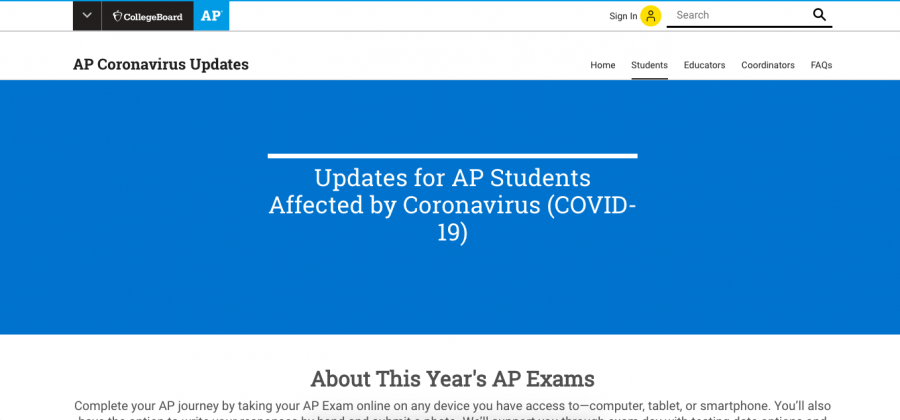The New AP Exam Structure During the Coronavirus Pandemic
How our students are responding to the new AP modifications.
Here is a screenshot from the College Board’s website that reads “Updates for AP Students Affected by Coronavirus (COVID-19).”
The onset of the Coronavirus has severely changed the way that school runs, and by extension, how Advanced Placement (AP) exams will be conducted. This year, rather than hosting the traditional three-hour in-person tests with a mix of multiple choice and free response questions, the College Board will email 45-minute tests to students consisting of only free response questions. Despite these significant changes, many colleges across the country will still accept this year’s AP tests for the same credit as they have in the past. The College Board has guaranteed refunds for students in light of these unusual circumstances and drastic changes. Due to these unique testing circumstances, many students are anxious to see how the tests will work out and everyone can acknowledge that with this strange situation, it is hard to think of a perfect solution.
Most of our students believe that, in light of this strange situation, the College Board has done the best that it could to come up with a practical solution given that there are not many viable options right now. However, some students still acknowledge that this solution is far from perfect, and they are likely going to cancel taking their exams because of it. Mica Nimkarn ’20, for example, was supposed to take the AP Statistics, AP Calculus AB, and AP Psychology tests, but is now considering dropping them. “My home is not a conducive working environment for me, and studying outside of the normal classroom setting won’t be as effective for the AP. Making the exam shorter and more free-response-based would also stress me out exponentially in comparison to the normal APs,” she said. Though Nimkarn does not feel she can effectively take the exams this year, she still admits, “I think this new structure is the best that the College Board can do given the current circumstances.”
Similarly, Emma Tiersten-Nyman ’20 does not think she will be able to do her best on these exams. She was signed up for the Psychology and Calculus AB exams, which she is most likely still taking, and said, “It will be really weird to take tests like this, and I’ll be less motivated to study because they won’t feel like real tests. Since there will be so few questions, it will be harder to do well, but in these circumstances, it’s hard to figure out the best solution.”

Emma Tiersten-Nyman ’20 is worried about the upcoming online AP Exam plans, but she acknowledges that there may not be a better solution.
Other students felt like the exam was a fine solution as long as it considered factors like cheating. Ben Bergerson ’20 had signed up for the AP exams for Calculus BC, Micro and Macro Economics, and Literature, but now will likely only take Calculus and Literature. Bergerson said, “The new structure is flawed in many ways. The problem of cheating is more of an issue than ever. The national raw score average would increase, meaning it’s harder to do well to get a 4 or 5 on the exam. Unless cheating can be managed to the extent that it is in schools, there is no advantage to being honest, which is far more important than any exam score.” These complaints have been considered, and the College Board has notified students that it will use sophisticated plagiarism software to detect cheating. For one, the College Board is specifically designing this test for an at-home administration, so the content will not be found in textbooks or online. Additionally, they are including digital techniques, such as the aforementioned plagiarism detection software, along with post-administration analytics, to check for plagiarism. Lastly, students’ teachers will be sent copies of the student’s work to monitor for inconsistencies. These techniques, along with severe consequences for cheating (colleges and Bronx Science will be notified), are the College Board’s attempts at addressing these concerns.
Some students, though, were less concessionary. Gesilda Noka ’20 is signed up for Micro and Macro-Economics, Calculus BC, Biology, and Statistics, and still plans on taking all of them for college credit. However, she is not completely satisfied. “There is no way that a 45-minute exam can possibly cover an entire year’s worth of material, as it can barely cover a single unit. The APs should have been canceled and fully refunded, or the College Board should have figured out a way to give each test at its full extent,” said Noka. The 45-minute limitation is being brought up by a lot of students, so we will have to see how the College Board manages to cover enough material in this short time. However, the reasoning behind this change is the fact that students are losing a lot of class time, and it would not be fair to administer the same test while having lost nearly six weeks of learning.
This new format will take some getting used to, but hopefully it only needs to be used this year. Students clearly have their critiques and this exam, in light of the circumstances, will no doubt have its flaws. However, considering the constraints the College Board has to deal with, it’s hard to picture anything remotely close to a “perfect” solution.
“In these circumstances it’s hard to figure out the best solution.”
Leann Goldberg is an Editor-in-Chief for ‘The Science Survey.’ She thinks journalistic writing is important because it allows the public to stay informed...
Sofia Mahairas is the Editor-in-Chief of ‘The Sciencey Survey’ and a Staff Reporter for the ‘The Observatory.’ She enjoys journalism because...

